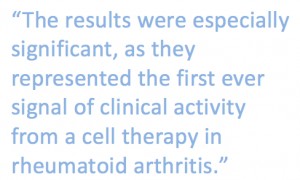Is the Next RA Breakthrough Going to be Stem Cell Therapy?
 Stem cell therapy: you’ve probably heard about its potential for cancer or maybe that it could be used to treat people with type 1 diabetes. In any case, it’s been a controversial topic amongst those in the medical field. So what would you think about using it to treat people living with rheumatoid arthritis (RA)?
Stem cell therapy: you’ve probably heard about its potential for cancer or maybe that it could be used to treat people with type 1 diabetes. In any case, it’s been a controversial topic amongst those in the medical field. So what would you think about using it to treat people living with rheumatoid arthritis (RA)?
A Belgian company called TiGenix believes that stem cell therapy could represent the next big breakthrough in rheumatoid arthritis research, and they’re putting their money where their mouth is. The company is already gearing up to commence Phase II testing of their new biological therapy next year.
The research team is currently enrolling patients with active RA symptoms who’ve not found any success through contemporary treatments like methotrexate and corticosteroids. You won’t find this study listed on our RA condition page, so we’re providing the details here.
Driving Rheumatoid Arthritis into Remission
TiGenix’s CEO, Eduardo Bravo, says that the primary objective of the research is to produce full disease remission.
“There is a need for a treatment with an alternative mechanism of action that could increase the proportion of patients brought into remission and reduce the need to progress to chronic, sequential, and expensive biological therapies,” explained Frank Luyten, MD.
(Luyen is the current chairman of rheumatology at the University Hospital of Leuven.)
“Many patients today remain functional, both in their daily and professional lives and in recreational activities. It is our hope that TiGenix’s product, a treatment with broad immunomodulatory spectrum, can bring the disease process to very low activity or remission in patients failing to respond to a state-of-the-art disease-modifying anti-rheumatic drug plus glucocorticoid treatment protocol in early RA,” wrote Luyen in a recent press release.
“This new biological product has a broad range of immunomodulatory properties, such as reacting with B-cells, T-cells, and macrophages. As a result, the stem cells often exert control over a proinflammatory environment,” stated Wilfried Dalemans, PhD, TiGenix’s chief technical officer of TiGenix.
A Promising Road for Stem Cell Therapy?
 Previous research on this therapy was led by Jose Maria Alvaro-Gracia, MD, PhD, of Hospital Universitario de La Princesa in Madrid. The research team tested the effects with 53 participants who had been living with RA for an average of 13 years. Each patient had tried treating their symptoms with more conventional drugs and even biologics without significant success.
Previous research on this therapy was led by Jose Maria Alvaro-Gracia, MD, PhD, of Hospital Universitario de La Princesa in Madrid. The research team tested the effects with 53 participants who had been living with RA for an average of 13 years. Each patient had tried treating their symptoms with more conventional drugs and even biologics without significant success.
The participants were divided into three groups for the study, but the results show that the group receiving the lowest-dose infusions had the best clinical response. The results were especially significant, as they represented the first ever signal of clinical activity from a cell therapy in rheumatoid arthritis. The research team seem quite relieved with the quality of their study’s data given how unmanageable the patient population ended up being.
There were reported cases of adverse effects in the study population. These included:
- Headaches
- Nausea
- Peroneal palsy
- Lacunar infarction
- Fever of unknown origin
The study team only linked one event (lacunar infarction) to the prescribed treatment, and the participant fully recovered after discontinuing the trial.
“These early clinical results are the first to suggest that IV infusion of expanded allogeneic adipose-derived mesenchymal stem cells is well tolerated for 24 weeks and could be associated with clinical benefit in the treatment of refractory RA,” concluded Alvaro-Gracia.
Looking forward, we can expect to see the results of the next phase of testing within the next three years (possibly in early half of 2017). We hope that the research team sees continued success with this stem cell therapy.